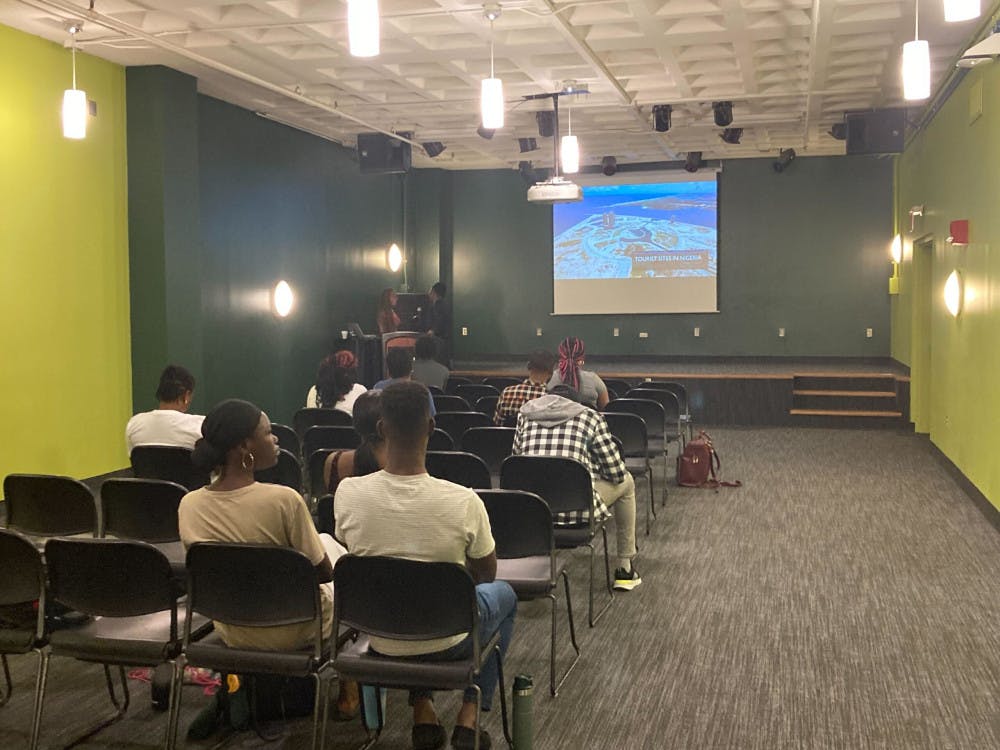Nigerian Independence Day | Photo by Emily Mancuso | The Wright State Guardian
On Monday, Oct. 2, students settled into the Rathskeller Room to learn more about Nigerian culture and independence from the African Student Union.
History and misconceptions
Nigeria, freed from British occupation in 1960, has a rich culture and history to share.
Nigeria is a West African country—the most populous in Africa and the sixth most populous in the world—that possesses over 250 languages and hundreds of ethnic groups.
ASU President Chinonye (Nonny) Odumodu proposed the event, citing the high population of Nigerian students of Wright State. ASU also hosted the event to show that the African Student Union is rebounding after a hard-hitting pandemic.
“I'm telling you to go to Korea, to China, to Mexico. You're gonna see a Nigerian there, so we're one of the most strong and diverse [countries],” Odumodu said. “We're also very resilient and hardworking, so we always want to make something new out of ourselves.”
Also a member of the Black Student Union, Odumodu reiterates that there is a spot for students in both African and African-American culture, whether you are exploring your heritage or just want to learn more about it.
“I want Black Americans on campus to also be part of ASU because we're all African at the end of the day, and what we've been striving to do, making that extra effort, getting people in here and letting them know, you don't just have to be African to show up. You can be white, you can be Black, you can be Asian. African culture, even I'm still learning,” Odumodu said.
Odumodu highlighted the beauty of Nigerian culture and also the struggles her and other African students face as a result of racism and ignorance.
“They see me as an African with an accent, and they're like, you know, ‘You lived in huts. How were the gorillas or did you ride gorillas to school? How did you come over here? Did you sail on a boat?’ So certain questions, you can tell some of them stem from ignorance, but you can also tell that some of them stem from racism as well,” Odumodu said.
ASU combatted this ignorance and lack of education with the one-hour event attended by Nigerians and non-Nigerians alike.
Learning about Nigeria
Odumodu and Micheal Oluwaseyi Clegg, a graduate student, presented on aspects of Nigerian independence and culture, such as tourist sites, religion, geography, music, ethnic groups, independence and more.
“ASU created an avenue for me to meet people, to share my concerns with people who could understand where I was coming from and help me settle easily into the system,” Clegg said.
Clegg informed attendees on various facts, such as Nigeria’s majority Muslim population, the main ethnic groups of the Yoruba, Hausa and Igbo, the beautiful waterfalls common to Nigeria’s land and the popular music known as Afrobeat.
Towards the end of the event, attendees learned of the history and struggle for independence. British occupation lasted from 1914 until 1960, when Nigeria broke free of British control on Oct. 1.
During the presentation, the University Center for International Education provided cupcakes decorated in the green and white colors of the Nigerian flag as well as other refreshments.
Reflections from attendees
“I am Nigerian, so I would definitely come again for this,” attendee Chiagozie Paul-Onyia said. “It is a nice showcase, a reminder of where I am from. When you are here most times, you kinda get disassociated from your roots in an attempt to integrate into American culture, so this is a nice reminder of the culture I am from.”
Depending on demand and the Nigerian population at WSU, Odumodu hopes to host Nigerian Independence Day again next year. All students are welcome to join ASU and BSU and enjoy their events. For more information about the organizations, visit their Engage pages.













